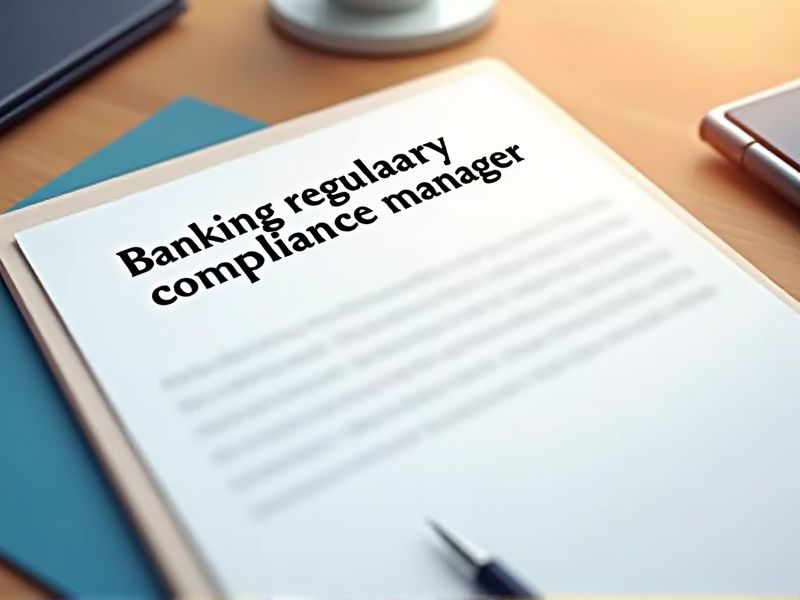
Banking regulatory compliance managers play a crucial role in ensuring that financial institutions adhere to complex laws and regulations. Their work prevents legal breaches, minimizes financial risks, and maintains consumer trust. Certain certifications equip these managers with specialized knowledge in navigating regulatory landscapes and applying best practices. Key certifications you may need for a Banking regulatory compliance manager include the following.
Certified Regulatory Compliance Manager (CRCM)
The Certified Regulatory Compliance Manager (CRCM) credential ensures that a professional has a comprehensive understanding of regulatory requirements, reducing the risk of compliance violations in banking. It enhances the bank's ability to navigate complex regulatory environments, ultimately safeguarding its financial and legal standing. CRCM certification signifies a commitment to ethical practices, improving trust and transparency with stakeholders. This credential helps in aligning a bank's operations with current laws, minimizing potential penalties and disruptions.
Certified Anti-Money Laundering Specialist (CAMS)
The rise of financial crimes has increased the demand for specialized professionals, and a Certified Anti-Money Laundering Specialist (CAMS) provides the expertise needed to detect and prevent money laundering activities. Regulatory frameworks have become more complex, creating a necessity for banking regulatory compliance managers to possess CAMS certification for effective navigation of these frameworks. In-depth knowledge of AML best practices gained through CAMS certification enables managers to implement robust compliance programs within banks. Evidence shows that banks with CAMS-certified professionals experience lower risk exposure and greater confidence in their regulatory compliance efforts.
Financial Risk Manager (FRM)
Banking regulatory compliance managers face complex and evolving regulations. FRMs offer expertise in identifying and managing financial risks that could lead to non-compliance. An FRM's skills in assessing market, credit, and operational risks ensure that banks remain within regulatory guidelines. Integrating FRM insights helps banks anticipate regulatory changes and adjust strategies accordingly.
Certified Fraud Examiner (CFE)
A Certified Fraud Examiner (CFE) helps identify and mitigate potential fraudulent activities, reducing financial losses in banking. Their expertise in fraud detection strengthens internal controls, ensuring compliance with evolving regulations. CFEs provide vital insights into fraud prevention, supporting the regulatory compliance manager's strategy. Leveraging a CFE's knowledge enhances the institution's reputation by promoting transparency and ethical practices.
Certified Compliance & Ethics Professional (CCEP)
The Certified Compliance & Ethics Professional (CCEP) credential provides a comprehensive understanding of compliance frameworks, essential for navigating complex banking regulations. It equips a regulatory compliance manager with the skills to design and implement effective compliance programs, reducing the risk of regulatory breaches. This certification ensures that managers stay updated with evolving laws and ethical standards, crucial for maintaining organizational integrity. Banks benefit from reduced legal penalties and enhanced reputation by having certified professionals who ensure adherence to regulations.
Certified Financial Services Auditor (CFSA)
Banks operate under rigorous regulation, requiring comprehensive audits to ensure adherence. A Certified Financial Services Auditor (CFSA) possesses a specialized understanding of financial service sectors, enabling precise audit assessments. This expertise assists a regulatory compliance manager in identifying potential non-compliance issues. Consequently, employing a CFSA can enhance the bank's ability to meet regulatory obligations efficiently.
Certified Risk and Compliance Management Professional (CRCMP)
The CRCMP designation signifies a professional's proficiency in identifying and mitigating potential risks within banking institutions. Banking regulatory compliance managers face stringent regulations; CRCMP certification ensures they are equipped with up-to-date knowledge of compliance standards. This credential provides assurance to employers and regulators that the manager possesses the technical skills necessary for maintaining adherence to legal requirements. Furthermore, holding a CRCMP can enhance a professional's credibility and career advancement prospects in the competitive banking sector.
Certified Internal Auditor (CIA)
A CIA brings a deep understanding of internal controls and risk management, essential for maintaining regulatory compliance in banking. This certification indicates a strong grasp of audit principles, crucial for identifying and mitigating compliance issues. A CIA's expertise aids in accurately assessing compliance risks and ensuring adherence to regulatory standards. The presence of a CIA can enhance the credibility and reliability of compliance reports.
Certified Information Systems Auditor (CISA)
A Certified Information Systems Auditor (CISA) is crucial for a banking regulatory compliance manager because it ensures a comprehensive understanding of auditing and control practices, which are essential in maintaining compliance with banking regulations. The credential signifies expertise in assessing information systems, critical for identifying potential compliance risks within banking operations. Banks operate in a highly regulated environment, and a CISA-certified manager can effectively design and implement robust internal controls to meet regulatory requirements. With cybersecurity threats on the rise, a CISA qualification provides the necessary skills to safeguard sensitive financial data, ensuring trust and stability in the banking sector.
Certified Public Accountant (CPA)
In banking, a CPA is essential for ensuring accurate financial reporting, a key requirement for regulatory compliance. CPAs possess expertise in auditing and internal controls, crucial for identifying and mitigating risks in financial activities. They are well-versed in the latest tax codes and accounting standards, aiding banks in adhering to complex regulatory frameworks. Their analytical skills help in interpreting financial data, enabling effective decision-making and maintaining compliance with banking regulations.
Summary
When you, as a Banking Regulatory Compliance Manager, obtain certifications, your expertise in regulatory guidelines significantly increases. This enhanced knowledge can improve your ability to navigate complex compliance issues and reduce potential legal risks for your institution. The certifications can also bolster your professional reputation, possibly leading to career advancement opportunities. Institutional trust often grows as customers perceive the bank as more reliable and well-governed.
